With ample maintenance, your air conditioner can work for 15 years or greater. But even the best maintained air conditioner will need to be updated down the road.
When you’re beginning to plan for air conditioning installation in Omaha, we realize that cost is number one on your list of questions. The silver lining is that getting a new air conditioner could be more economical than you think it is, due to rebates, our special offers and financing for qualified customers. You’ll also receive improved energy efficiency, which will usually pay off over its life span through less expensive electrical bills.
Here’s what to anticipate when you’re getting a new air conditioner.
When to Schedule Air Conditioner Replacement
Knowing when to repair or replace your air conditioner might be tricky. Here’s what our pros advise.
Replace
- Your air conditioner is older than 10 years old. While some might run longer, many air conditioners work for around 15 years with routine maintenance. We recommend prepping for air conditioning replacement close to the 10-year point. Even if you replace it when it’s only a decade old, the U.S. Department of Energy says this swap could save you 20-40% on cooling costs.
- You’ve skipped annual maintenance for many years. Similar to a car, your cooling system has to have annual air conditioning maintenance. Skipping this essential service can cause decreased efficiency, more persistent repairs and even a decreased life span.
- Your air conditioner needs frequent or costly repairs. Needing air conditioning repair is frequently the consequence of skipping maintenance But as your air conditioner gets older it’s more likely to experience a big breakdown. When repairs are more than half the cost of a new air conditioner, it’s time to get a new one.
- Your home feels unpleasant. If your home feels too sticky or you’re experiencing hot and cold spots in given areas, your air conditioner could be struggling to keep up. This is a hint it’s time to replace it.
- Your energy bills are high. Your air conditioner loses efficiency as it gets older. As a consequence, it may need to operate more frequently or longer to keep your house at your desired temperature. Newer air conditioners have the most up-to-date energy-efficient technology to keep your house comfortable and electrical bills reasonable.
- Your air conditioner runs on R-22 refrigerant. If your air conditioner was installed before 2010, there’s a decent chance it has Freon. Also called R-22, this refrigerant is no longer being produced because of its detrimental effects on the environment. You can continue to use your air conditioner, but if it were to have a refrigerant leak, fixing that would be extraordinarily expensive. This is because R-22 is only available in limited, recycled amounts.
Repair
- Your air conditioner is no more than 10 years old. If your air conditioner is newer, it’s smartest to repair it.
- Repairs are infrequent or reasonable. The wisest way to avoid unexpected repairs is to have yearly work done. But when repairs are only needed intermittently or are economical, repair your air conditioner.
- Your air conditioner is covered by a warranty. Most air conditioners come with a 5- to 10-year limited warranty that often covers the compressor. Your exact warranty length is up to your manufacturer, but it provides valuable protection in the event of a major failure. If your air conditioner is protected by warranty, we suggest fixing it.
Average Air Conditioner Cost
Most homeowners spend around $4,631 on a new air conditioner, per national averages compiled by HomeGuide. Air conditioner cost averages often range from $3,350 to $5,912, but your exact cost {might|could|may] be different.
There are several aspects that influence your total cost, such as:
- The air conditioner model you choose, since more energy-efficient ones are more expensive.
- The size your space needs.
- If you need to install new ductwork, which can be needed if your ductwork is old or inefficient.
We offer free estimates at The Frazier Company so you can be confident you’re getting a good deal. And with our complete range of air conditioners, there’s an energy-efficient model that works with just about any budget.
Air Conditioner Size
Air conditioner size is essential. A system that’s undersized won’t be able to keep your house cool. And one that’s oversized may turn on and off too many times, or short cycle. This behavior can drive up your energy expenses and wear your air conditioner out more quickly. This may also cause temperature inconsistencies and make your home feel less cool.
At The Frazier Company, our techs have many years of experience in accurately sizing and installing the right air conditioner for your home. The size you need depends on how large your home is, in addition to a few other considerations. Some of the most common sizes include:
- 2 ton, which cools up to 1,000 square feet
- 3 ton, which cools up to 1,600 square feet
- 4 ton, which cools up to 1,900 square feet
- 5 ton, which cools more than 2,000 square feet
Other things that can influence air conditioner size are:
- The climate in Omaha.
- Ductwork quality and age.
- How many windows your home has and the style, since expansive or picture windows might be less efficient.
- If your residence gets more sun or shade.
- Insulation quality and depth.
- How many people are in your family.
SEER Ratings
Your air conditioner’s efficiency is tied to its SEER, or Seasonal Energy Efficiency Rating. This rating measures how well it uses electricity to create cooling. The higher the number, the more efficient the air conditioner is.
When you’re installing a new air conditioner, it’s important to be aware:
- Older air conditioners are rated around 8-9 SEER.
- New air conditioners start at 13 SEER. Ones installed in the southwest and southeast must be at least 14 SEER due to U.S. Department of Energy regulations. As of 2017, these SEER rating requirements have saved homeowners trillions of dollars.
- ENERGY STAR®-certified air conditioners begin at 14.5 SEER.
- Higher SEER-rated air conditioners have more features to help you save more. These features may include variable-speed cooling. Instead of going at 100% all the time, these air conditioners can reduce blower speeds adjusted for your cooling needs. This leads to quieter and more energy-efficient air conditioning. While an air conditioner with a better SEER rating is typically higher priced, it may be eligible for more rebates. And the energy savings over its lifetime could help it pay for itself.
Schedule Your Air Conditioning Installation with The Frazier Company Today
When you’re planning for air conditioning replacement, the company who installs it is just as essential as the model you go with. The Frazier Company is one of the top names for air conditioning installation in Omaha. From helping you find the right solution for your home to discussing financing options to professional installation, partnering with our pros is a breeze. Contact us at (402) 919-5185 to begin right away!

